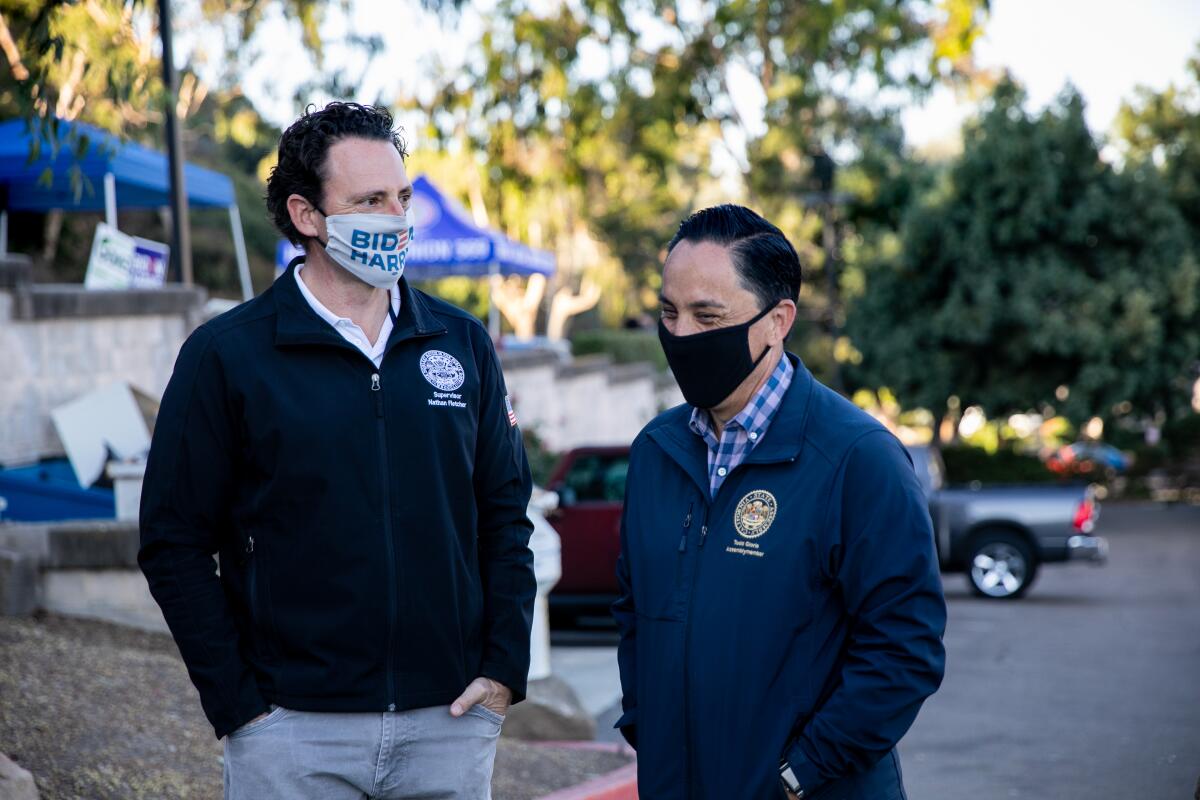Democratic San Diego County supervisors, with new majority, plan to bring change to region

First-term Supervisor Nathan Fletcher and front-runner Nora Vargas share their visions for new board priorities for San Diego County.
- Share via
SAN DIEGO — San Diego Democrats have made major strides over the last decade to expand their influence in local politics, but one goal that has long evaded their grasp has been a majority on the county Board of Supervisors.
That appears to have finally changed.
With 370,000 ballots outstanding Wednesday, Democrats have already captured a second seat on the five-member board while building a seemingly insurmountable lead in the race for a third seat.
In the District 3 race, which includes coastal San Diego, Solana Beach, Encinitas and Escondido, Democrat Terra Lawson-Remer, an economist and former senior advisor in President Obama’s Treasury Department, has widened her lead over Republican Supervisor Kristin Gaspar.
And in the race for District 1, representing the South Bay, Democrat Nora Vargas, a healthcare advocate and Southwestern College trustee, has a sizable lead over Democratic state Sen. Ben Hueso.
Neither Hueso nor Gaspar have conceded.
In interviews Wednesday, Supervisor Nathan Fletcher, currently the lone Democrat on the board, and Vargas said they feel excited and emboldened to take the board in a different direction and tackle some of the region’s greatest challenges using a more progressive lens.
“Two years ago I won an election breaking through the red wall,” Fletcher said. “As a county we have taken positive steps forward, certainly around mental health and drug treatment. But now we’re going to be in a position to really move, to substantively change the focus, the culture, the direction and the investment of county government in a way that will significantly benefit the people of San Diego.
Although county supervisor is technically a nonpartisan post, political parties are often involved in supervisor campaigns. The board shapes spending priorities for the county’s more than $6.4-billion budget.
Lawson-Remer said Wednesday she is excited about changes on the board, but she declined to discuss her priorities until more votes are tallied.
During their interviews, Fletcher and Vargas laid out some of their top priorities for the newly constituted board, which will assume office in January.
Vargas, who will be the first Latina elected to the board if results hold, said a top priority will be helping mitigate the effect of the COVID-19 pandemic and pushing for better health equity and accessibility.
She noted that District 1 residents have been disproportionately harmed by the pandemic, saying it’s important for the county to get more rapid testing sites to the region.t
She also said she plans to introduce an initiative to increase child-care access and wants to work with her colleagues to develop a better climate action plan. And she wants the county to do a deeper dive into allocating behavioral health resources, to look at housing issues from a regional perspective and to better connect residents to their county government.
“I’m absolutely committed to making sure our residents are actively engaged in the process and they feel county government is much more transparent for them,” Vargas said. “Building healthier communities is not just a slogan, but something we can work on together.”
Fletcher pointed to increasing county government transparency and accessibility as priorities. He also expects the newly reconstituted Board of Supervisors to contrast with previous boards in its attitude about climate change.
In recent years, county supervisors have spent nearly $1 million in legal fees defending its climate action plans. Courts have ruled against the county six times over the last decade for failing to meet state climate standards.
Fletcher said he also believes the new board will change its approach to land use issues, cannabis policy, the county’s jail medical system and the working relationship with Gov. Gavin Newsom.
He said San Diego County has clearly changed significantly over the last several decades, as have voters’ expectations.
“Our job as elected representatives is to make sure we implement change into policy so that the commitments that were made to the voters are fulfilled,” Fletcher said.
Although many things are bound to change, the Democratic supervisors highlighted some areas they expect the board to operate similarly to past boards.
Fletcher said he expects the new board to continue operating in a fiscally responsible way, making “targeted investments” and working collaboratively despite party differences.
“I think we all come at this in the spirit of collaboration,” Fletcher said, adding he thinks he’ll work well with either Steve Vaus or Joel Anderson, two Republicans locked in a nail-biter of a race to fill East County’s District 2 seat.
“When there are disagreements, that’s what voting takes care of,” Fletcher said. “It’s a healthy thing in democratic bodies to have some dissent and disagreement.”
Vargas praised her predecessor, Supervisor Greg Cox, for already reaching out to help with the transition. She said she too is optimistic that the board’s Democrats and Republicans will work together effectively.
“The children who are going to sleep hungry every night don’t care about Republican or Democrat,” she said. “What they care about is whether you’re actually looking out for them, same as their teachers and people who have been waiting in line for years to get housing.”
Clark writes for the San Diego Union-Tribune.
More to Read
Sign up for Essential California
The most important California stories and recommendations in your inbox every morning.
You may occasionally receive promotional content from the Los Angeles Times.














